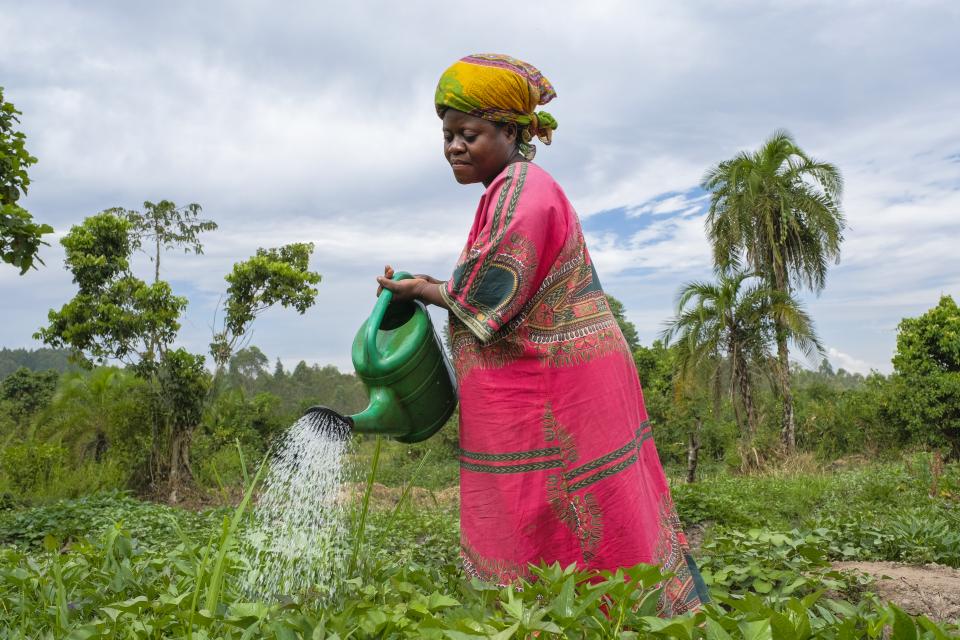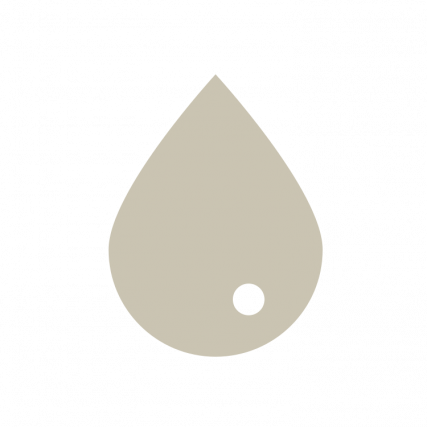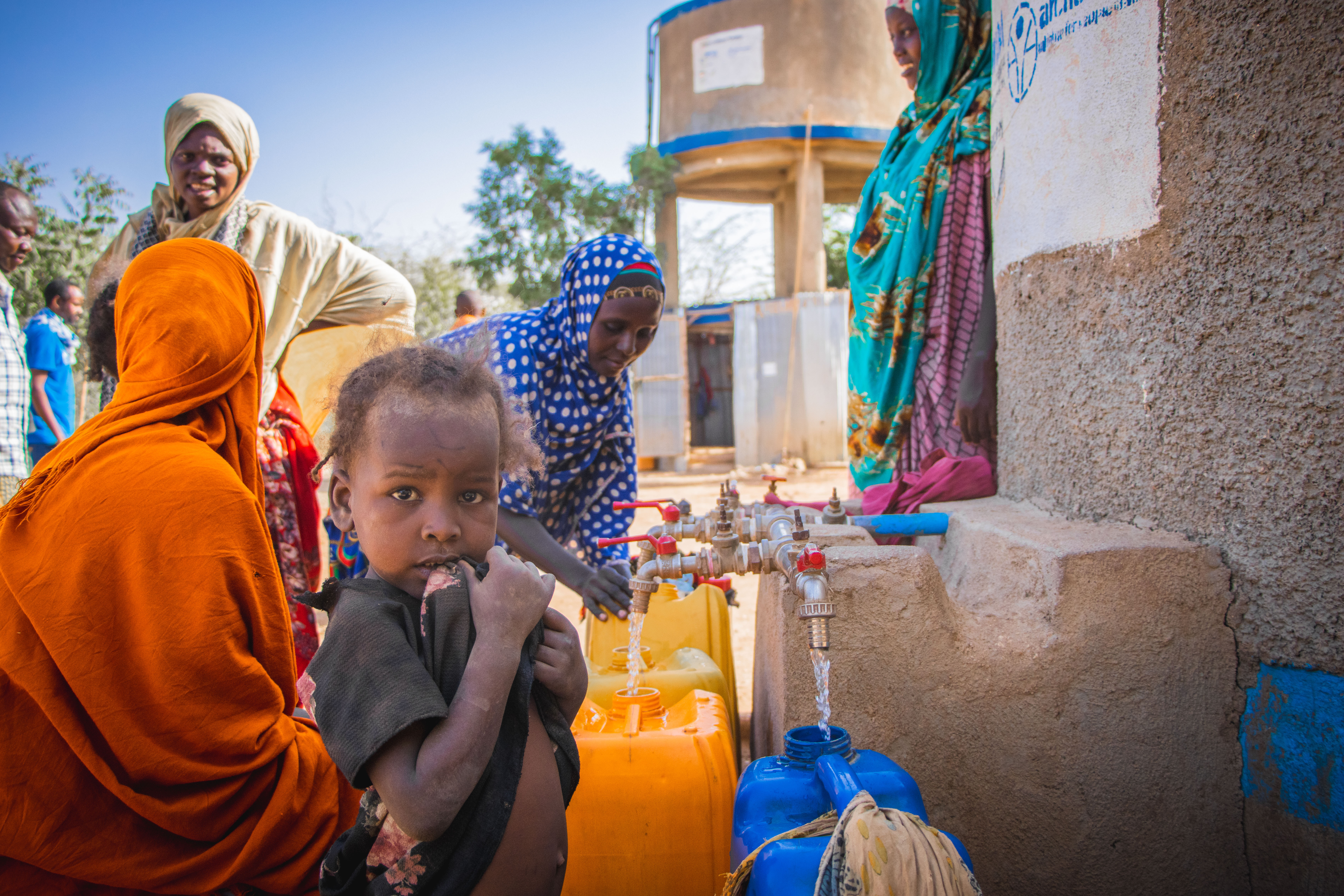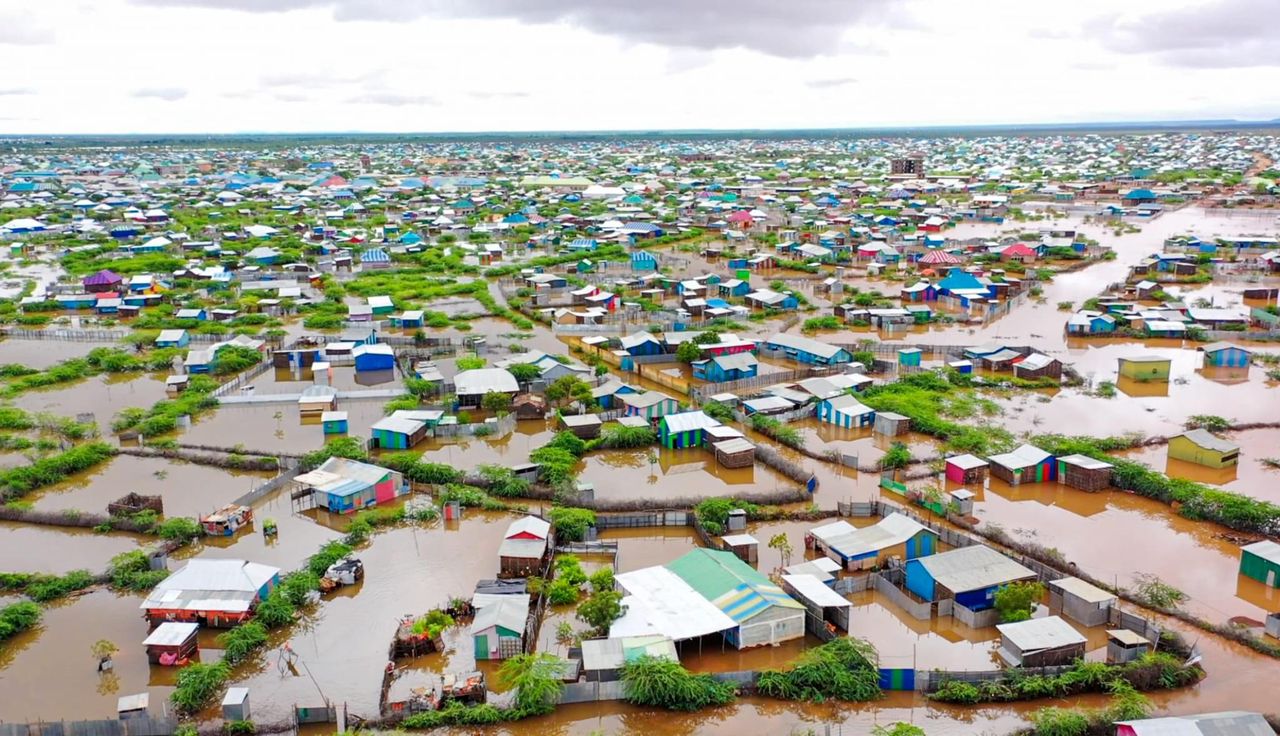
In more and more parts of the world, global warming is resulting in extreme weather events and persistent water shortages. The increasing number of disasters threaten the lives of billions of people and make humanitarian aid indispensable. Those providing support on the ground have a responsibility to prepare the population for impending disasters in the best possible way and to take a climate-sensitive approach in order to prevent further damage to the ecosystem. With a global program that pays particular attention to such aspects, arche noVa is taking an important step towards ensuring that humanitarian aid can do justice to this mission.
Life-saving emergency aid – for example the distribution of water, food and hygiene products – is a top priority in these regions. However, aspects of sustainability and climate friendliness must not be ignored under any circumstances. On the contrary: humanitarian aid organizations have a responsibility to protect existing ecosystems at both local and global level – in short, to provide green humanitarian aid.
What is green humanitarian aid?
When planning, implementing and monitoring aid measures, those who provide green humanitarian aid pay attention to a forward-looking, sustainable, environmentally friendly approach that is adapted to the local ecosystem.The most important basis for this are the principles of the Climate and Environment Charter for Humanitarian Organizations, which arche noVa has committed to implementing. The charter covers aspects of climate protection and inclusion, but also calls for more localization and empowerment of local actors.
In cooperation with ASB, the German Toilet Organization and various local partner organizations, arche noVa is implementing a global programme in a total of 14 countries that pays particular attention to the principles of the Charter and explores the question of how the ecological footprint of humanitarian aid can be reduced.
Safe water and sanitation: Climate-sensitive and inclusive
In Zusammenarbeit mit dem ASB, der German Toilet Organization und verschiedenen lokalen Partnerorganisationen realisiert arche noVa ein globales Programm in insgesamt 14 Ländern, das den Prinzipien der Charta besondere Aufmerksamkeit schenkt und der Frage nachgeht, wie sich der ökologische Fußabdruck humanitärer Hilfe reduzieren lässt.

Sichere Wasser- und Sanitärversorgung: Klimasensitiv und inklusiv
The global increase in droughts and floods is denying more and more people access to safe water.Around two billion people currently have no way of meeting their daily needs – neither to quench their own thirst nor to provide adequate water for crops or livestock.
Added to this is the lack of sanitary facilities and waste disposal systems in many areas, which can quickly pose a serious health risk, especially in the event of flooding. If waste and faeces are washed into lakes and rivers and there is no alternative source of water, there is a risk of serious infectious diseases breaking out.
arche noVa's program aims to achieve a holistic improvement in water and sanitation in regions that are particularly affected by water scarcity and extreme weather events. Climate sensitivity plays a priority role in all phases of the program - for example in the establishment of environmentally friendly waste disposal systems or the integration of systems that use renewable energies (e.g. photovoltaics).
By signing the Climate Charter, arche noVa has also committed to actively promoting gender equality and inclusion. In the WASH sector, this includes the barrier-free design of water and sanitation facilities and the creation of safe spaces for women and girls. In addition, the participation of women and other vulnerable groups is promoted.
Disaster risk reduction protects the livelihoods of the population at risk
The climatic changes triggered by global warming are progressing at a rapid pace worldwide.In regions characterized by poverty, the population usually lacks the means to adequately prepare for extreme weather events in order to protect their lives and livelihoods.
In the event of a disaster, arche noVa provides emergency humanitarian aid in the project regions. This includes the distribution of essential goods such as drinking water and basic hygiene products. However, in order to mitigate the effects of droughts, floods and plagues in the long term, strong local and regional structures with sound expertise in disaster prevention and management are essential.
Comprehensive knowledge transfer on disaster prevention issues strengthens the resilience of the affected communities, makes them capable of acting and enables them to take proactive measures. These include early warning systems, disaster action plans and the creation of alternative sources of income.
arche noVa organizes and supports the transfer of knowledge and the creation of the necessary structures at local and regional level. Stakeholders are also given the opportunity to network with each other and benefit from the mutual exchange of experience.
Networking as a driver of innovation in green humanitarian aid
Progress requires exchange - that's why we bring people from all over the world together as part of the global project to talk about their experiences in green humanitarian aid. Actors at local, regional and global level are given the opportunity to receive further training, enter into collaborations and thus drive forward the practical implementation of climate-sensitive, inclusive approaches.
Together with our partners, projects can be implemented in a total of 14 countries: Ethiopia, Somalia, Somaliland, Niger, Mali, Lebanon, Iraq, Bangladesh, Myanmar, Indonesia, the Philippines, Haiti, Honduras and Nicaragua.
Project Overview
Strengthening local climate-sensitive and universal WASH capacities by applying and disseminating the green humanitarian aid approach
Communities in Ethiopia, Somalia, Somaliland, Niger, Mali, Lebanon, Iraq, Bangladesh, Myanmar, Indonesia, the Philippines, Haiti, Honduras and Nicaragua that live in rural/semi-urban areas and are particularly vulnerable to disasters and the effects of climate change; particularly vulnerable population groups within these communities.
Climate-sensitive humanitarian WASH supply
- Establishing innovative water supply and wastewater management systems
- Creating universal access to safe water
- Measures to improve barrier-free and gender-sensitive sanitation
- Measures to reduce risks resulting from improper waste disposal
- Inclusive and local humanitarian disaster risk reduction
Identification and training of relevant stakeholders at local, regional and national level
- Conducting climate projection analyses, climate and disaster risk analyses
- Establishing and strengthening inclusive disaster risk reduction structures at local level
- Developing climate-sensitive disaster risk reduction plans and community-based early warning systems
- Developing and improving mechanisms for anticipatory humanitarian aid
- Promoting networking and coordination of actors relevant to disaster and climate risk management
Green humanitarian aid
- Analyzing potential environmental risks and developing a detailed concept
- Motivating local partners to sign the Climate and Environment Charter for Humanitarian Organizations
- Training and mentoring in the development of action plans to implement the Climate Charter
- Training and mentoring in the use of environmental screening/assessment tools
- Networking of local partners and institutions
Knowledge management
- Active involvement in relevant networks and forums
- Exchange and publication of experience from project implementation and the project countries
- Advocacy activities and lobbying at various levels
- Arbeiter-Samariter-Bund Deutschland (ASB)
- German Toilet Organization
- Organization for Welfare and Development in Action (OWDA)
- Nouveaux Horizons (NoHo)
- Mada Association
- Action for Social and Economic Progress (ASEP)
- Tankamel Sawa (TKS)
- Sopyay Myanmar Development Organization (SMDO)
- Ethnic Equality Initiative (EEI)
- German Federal Foreign Office
- Aktion Deutschland Hilft
In Zusammenarbeit mit dem ASB, der German Toilet Organization und verschiedenen lokalen Partnerorganisationen realisiert arche noVa ein globales Programm in insgesamt 14 Ländern, das den Prinzipien der Charta besondere Aufmerksamkeit schenkt und der Frage nachgeht, wie sich der ökologische Fußabdruck humanitärer Hilfe reduzieren lässt.


















